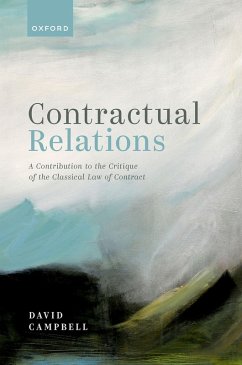
Contractual Relations (eBook, ePUB)
A Contribution to the Critique of the Classical Law of Contract
Versandkostenfrei!
Sofort per Download lieferbar
54,95 €
inkl. MwSt.
Weitere Ausgaben:

PAYBACK Punkte
27 °P sammeln!
Written by one of the leading contributors to the relational theory of contract, Contractual Relations authoritatively explains the form of the existing law of contract by relating it to its economic, legal, and sociological foundations. This volume demonstrates that economic exchange and legal contract rest on a moral relationship by which each party legitimately pursues its self-interest through recognition of the self-interest of the other. This essential relationship of mutual recognition is in stark contrast to the pursuit of solipsistic self-interest that is central to the classical law ...
Written by one of the leading contributors to the relational theory of contract, Contractual Relations authoritatively explains the form of the existing law of contract by relating it to its economic, legal, and sociological foundations. This volume demonstrates that economic exchange and legal contract rest on a moral relationship by which each party legitimately pursues its self-interest through recognition of the self-interest of the other. This essential relationship of mutual recognition is in stark contrast to the pursuit of solipsistic self-interest that is central to the classical law of contract. Self-interest of this sort is not morally defensible, nor does it enhance economic welfare. It is for these reasons that the classical law is legally incoherent. The fundamental inadequacies of the classical law's treatment of agreement, consideration, and remedy have emerged as the doctrines of the positive law of contract have been progressively developed to give effect to the relationship of mutual recognition. The welfarist criticism of the classical law has, however, failed to develop a workable concept of self-interest, and so is at odds with what must be retained from the classical law's facilitation of economic exchange and the market economy. The relational law of contract restates self-interest in a morally, economically, and legally attractive manner as the foundation of the social market economy of liberal socialism. Contractual Relations is a fundamental critique of the classical law of contract and the welfarist response to the classical law, and a major statement of the relational theory of contract. This is an essential work for academics, advanced students, and others wishing to understand the fundamental law, economics and sociology of contract and exchange.
Dieser Download kann aus rechtlichen Gründen nur mit Rechnungsadresse in A, B, BG, CY, CZ, D, DK, EW, E, FIN, F, GR, HR, H, IRL, I, LT, L, LR, M, NL, PL, P, R, S, SLO, SK ausgeliefert werden.













